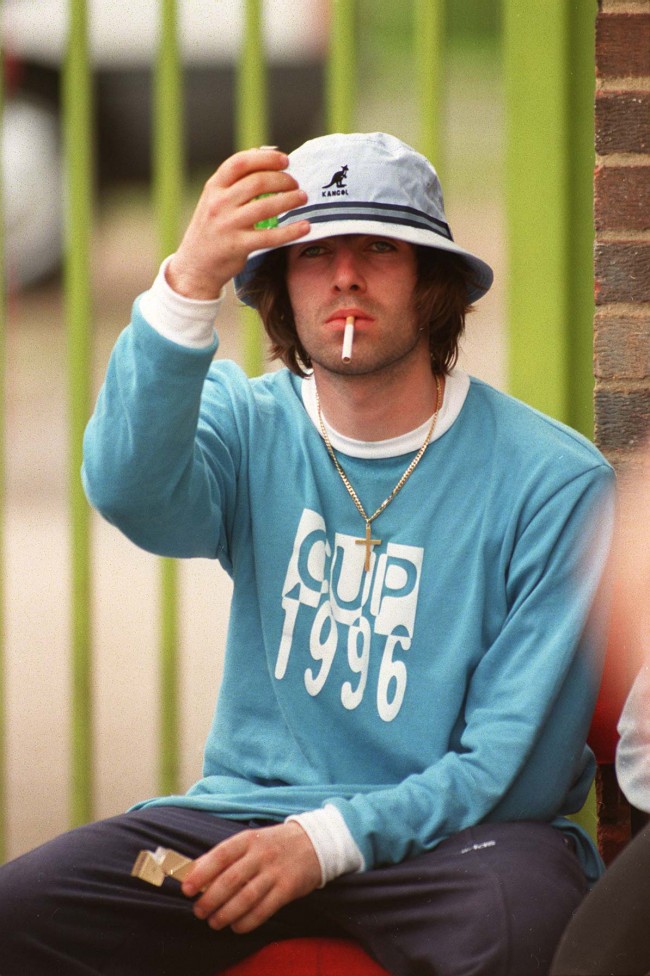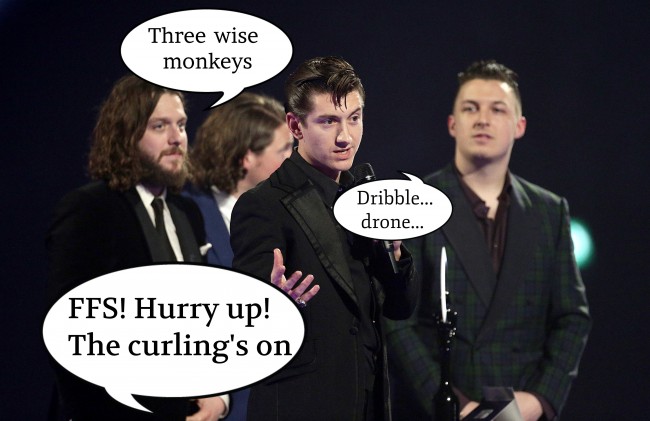Music Category
Music news and reviews, music videos and tittle tattle, with a lingering look at the past from Anorak. A source for rock, pop, album and live music, new releases, artist interviews and features.
Fruit of the Rhyme: 8 Songs of Fruit

THE problem with songs about food is that, well, they’re never really about food. Tasty as brown sugar is, the Stones weren’t really singing about sucrose. And when Robert Plant sings “Your custard pie, yeah, sweet and nice. When you cut it, mama, save me a slice” he’s not talking about pastries. You might say it’s a time honored tradition for rock and pop musicians to use food as symbols of sex and drugs.
We certainly can’t go through them all, so let’s narrow it down and focus just on songs with fruit in the title. Here’s a playlist that not only is interesting and fun, but also rich in Vitamin C.
1. “Apples and Oranges” by Pink Floyd
The setting is the produce section at the grocery store; however, apples and oranges are also an allusion to the differences between Syd and a girl he sees there (who, according to Syd himself, he’d been stalking for hours).
In this video, Floyd makes an appearance on American Bandstand. Syd looks absolutely stoned out of his mind, and you can tell the cameraman takes care to avoid him as much as possible.
2. “I Am a Tangerine” by Tommy James and the Shondells
Tommy has admitted that he was hopelessly wasted when he wrote this song, and that it makes no sense whatsoever. Don’t go reading clever allusions and metaphors into this one, folks. When Tommy screams “Hello Banana”, he was genuinely introducing himself to a piece of fruit.
3. “Peaches’ by The Stranglers
“Peaches” is a simple song about walking up and down the beach staring at the ladies. However, the fruit acquired a gynecological connotation by the line:
“Will you just take a look over there. Is she tryin’ to get outta that clitares?
“Clitares” being a French word for bathing suit, and I’m sure The Stranglers were well aware of how the word would get misinterpreted. Clever bastards.
4. “Tangerine” by Led Zeppelin
Led Zep were no strangers to fruity music – let’s not forget “The Lemon Song”. Page wrote this one during his Yardbirds days, purportedly about singer-songwriter Jackie DeShannon. The false start at the beginning begat an interesting urban legend – that the intro was the remnant of the “the greatest song ever recorded” but the tape was destroyed, and both Plant and Page couldn’t remember how it went. This snippet at the beginning (not in the video above) is all that remains.
It’s total bulls**t, but nonetheless it’s an urban legend that should be fostered and encouraged. Of course, when it comes to fruit-centered urban legends, nothing will compare to the “Cranberry Sauce/I Buried Paul” conspiracy.
5. “Raspberry Beret” by Prince

Theories abound regarding the meaning of this song. Many feel it’s just a simple story about a young nobody who becomes captivated by a woman who enters the store where he works. Prince was under fire from Tipper Gore over his racy lyrics for “Darling Nikki”, so he wanted to tone things down a bit. But the fact that the store is owned by “Old Man Johnson” belies a dirty subtext. After all, this is the same guy that brought you “Soft and Wet” and “Cream”.
So, what does it mean? Some think the “raspberry beret” refers to an uncircumcised penis. Others say it’s menstrual blood. I say this is may be best left unanswered.
6. “Blackberry Way” by The Move
Very much in the vein of “Penny Lane”; sort of a downbeat answer to the peppy McCartney classic. Personally, I cannot get past the “ooh-wah” bridge (at about the 1:45 mark in the video) which is lifted directly from Harry Nilsson’s “Good Old Desk”. It’s stolen so exactly, the song is ruined for me.
7. “Cherry, Cherry” by Neil Diamond
Speaking of plagiarism, “What I Like About You” by the Romantics features a guitar riff pretty damn similar to Diamond’s “Cherry, Cherry”. Of course, there’s always some borrowing and cross-pollination in pop music. In fact, you could argue “Cherry, Cherry” owes some of its melody to “Dirty Water” by The Standells.
Whatever its roots, I’m inclined to agree with Rolling Stone in calling this one of the greatest three-chord songs of all time. You’ll notice no horns or drums; that’s because this hit was actually a demo version. Adding drums, horns and other polish detracted from the energy, so they kept the original.
8. “Dear Delilah” by Grapefruit
I could have ended this playlist on top with “Strawberry Fields”, “I Heard It Through the Grapevine” or “Blueberry Hill”. Instead, I’ll invalidate the entire premise of this article and offer up a song without any fruit at all in its title. The band’s name is certainly fruity enough, though. Grapefruit was of the hallowed 60s tradition of bands naming themselves after fruit (ex. Moby Grape, The Lemon Pipers, Strawberry Alarm Clock… not to mention Apple Records). In Grapefruit’s case, John Lennon actually named them after Yoko’s awful 1964 book.
Grapefruit’s singer is a member of the amazing Young family – the same clan that spawned AC/DC (Malcolm and Angus Young) and The Easybeats (George Young). Grapefruit had the full support of The Beatles, but couldn’t achieve the success they no doubt expected.
You might say that everything was going peachy keen at Apple, but they wanted to be top banana, and ended up with sour grapes.
(insert sounds of crickets chirping)
Sorry. A fruit pun was bound to happen at some point. My sincere apologies.
Posted: 10th, March 2014 | In: Flashback, Key Posts, Music | Comments (3)
Lily Allen: Not Keen On Feminists
FEMINISTS are really, if we’re being honest here, only truly great at one thing – and that’s picking holes in people’s arguments. That would be the arguments of the patriarchy, sexists and bigots and, most importantly, the arguments of other feminists.
Throwing a match on the kindling is Lily Allen, who thinks feminism shouldn’t even be a thing in 2014, stating that “everyone is equal” in the modern world.
Good news for all those children who have been victims of FGM, the women who are denied rights by backward governments and the rest.
Read the rest of this entry »
England To Have A World Cup Song Befitting How Dull They’ll Play
ANYONE who saw England play against Denmark last night or, indeed, have ever seen England play in any tournament of any kind, will know that everyone’s going to be treated to some spectacularly dull football.
In Brazil, it is pretty obvious that the English will wilt like old salad in the tropical heat. It’ll be a marvel if they even get out of their group, which features Luis Suarez’s Uruguay, the mighty Italy and Costa Rica.
With England’s Crapenaccio on offer, we need a song that will befit England’s laboured performances.
So step forward Gary Barlow – the dowdiest of popstars – alongside Mel C and Emma Bunton, Kimberley Walsh and Gary Lineker – who together, will record England’s official 2014 FIFA World Cup single.
Read the rest of this entry »
Three Chick Discs: Disco Era Threesomes For Your Listening Pleasures
IN the disco era there began a phenomenon of immense historical insignificance: the emergence of all female musical trios. Sure, there had been The Supremes, and there were various disco/soul trios that genuinely kicked ass (etc. The Three Degrees, Labelle), but these bands were different. This new breed was basically talentless, and exuded an overt sexuality (i.e. they couldn’t sing, but at least they were hot). Every song in their entire catalog (with 0.00 exceptions) was about sex, and every performance and music video operated unflinchingly to the “sex sells” approach.
The trend extended into the 1980s, paving the way for groups like Destiny’s Child (who were less one-dimensional). Largely forgotten in the annals of pop history, all that remains are the vinyl relics which I hereby dub “Three Chick Discs”. Here are a few examples
“Make Love Whenever You Can” by Arabesque

Make love: Do it today, don’t wait until tomorrow
Make love: The only way to wipe away your sorrow, love
Read the rest of this entry »
Posted: 6th, March 2014 | In: Flashback, Key Posts, Music | Comment
Iggy Pop Wants A Kettle, Bob Hope And Fat People From Miami: The Tour Rider In Full

IGGY Pop, star of one of the greatest rock photos of all time, the man who faked Lou Reed’s death, Richard Wilson look alike, ToTP teddy molester, performer of the most revered failed stage dive, the man for whom the show did not always go on, has created one of the most memorable tour riders for his shows.
Well, Pop’s road manager Jos Grain has, as The Smoking Gun reports on the “Marvellous and Most Instructive Information Document…. Including Utterly Confusing Comments and Asides.”
The 2006 rider , has been followed by the 2012 tour.
Read the rest of this entry »
Listen To All Parts Of Robert Ashley’s Perfect Lives – The Televised American Opera
ROBERT Ashley (1930-2014). The composer was 83.
Kyle Gann, who recently wrote a biography said of the Michigan-born composer, who in 1958 created the Cooperative Studio for Electronic Music , a pointer to his eperiments with audio synthesis.
“Bob was one of the most amazing composers of the 20th century, and the greatest genius of 20th-century opera. I don’t know how long it’s going to take the world to recognize that.”
Thanks to the internet, the past never goes away. You can hear some of Ashley’s work in full.
In 1997, he spoke to Furious:
PSF: How did you decide to make your works as all being operas?
In 1975, there were no operas in America. I was interested in opera and it seemed to me that the only possible theatre for contemporary opera would be television. So I started working towards a kind of television kind of opera. I started designed the work so that it would be usable on television. I think it’s still true.
PSF: How did you see television as an ideal medium for operas?
It’s contemporary. It’s new. Many more people watch television than go to opera houses. There aren’t any opera houses in the United States. The possibilities for contemporary opera are very small. I thought when I started, it looked more promising (to work with television). Now, in the last few years, television has become much more conversative. But I still think there’s going to be a marriage of television and some form of opera. It might not happen in my lifetime but I still think it’s inevitable. The whole idea of the opera house is so dated anyway. It’s such a nineteenth century idea. Because of that probably, there aren’t any to speak of (maybe 3 or 4). It doesn’t really allow the idea of opera to really grow. I thought if I could get television interested in opera, it would make a kind of new thing that would allow composers to build a whole new repertoire.
It was more promising fifteen or twenty years ago than it is now. The first opera I did, Music With Its Roots in Ether (1976), has been broadcasted a lot. The next one I did, Perfect Lives (1980), was produced by Channel 4 in Great Britian and was shown there for two years and then throughout Europe but only parts of it have been broadcast in the United States. Now in ’97, television is so conserative that it doesn’t look promising. But I think it’ll change back. I think it’ inevitable that there has to be some new genre in television. Television goes through these periods of incorporating new things. First there was live comedy then there were soap operas then there was news and now there’s a lot of television about sports. We went through a period of MTV with pop music videos too. Television always needs new materials and it’s just a matter of time until there’s the right audience for new work that’s not just pop music. When that happens, it’ll be a very good time for composers to do serious big, narrative pieces.
PSF: Why do think there has been resistance to this kind of idea in American television?
Because they’re stupid I guess. Opera on television in Europe is very important. If you think about it in the broadest sense: a lot of the dramas made in India with music are practically operas. They’re not sung but they have a very big appeal. I don’t know why American television people are so stupid but at the moment, they just seem to have some sort of a block. They just do what they do and they do it for a certain number of years. Then it wears out and they try something else. It’s just a matter of time I think.
Brian Robison, of Cornell University, has posted on YouTube 4 American Composers, directed by Peter Greenaway in New York in 1985.
Compared to Meredith Monk and Robert Ashley, John Cage and Philip Glass are household names, yet their relative fame frequently turns on the persistence of misconceptions. All too often, even scholars who might be expected to know better portray Cage as either charlatan or nihilist. Critics in the 1980s tagged Glass’s music as “classical music for people who don’t like classical music,” suggesting his shrewd exploitation of the yuppie market. Director Peter Greenaway and producer Revel Guest weave representative musical excerpts with interviews to present the personalities more accurately, and, in so doing, establishes a broader context for listening. Perhaps the most striking revelation of these documentaries is that such notorious iconoclasts are so soft-spoken in person (compared to the shy, halting Ashley, the loquacious Monk seems downright assertive).
Ashley’s TV opera Perfect Lives was reviewed by Frieze:
As living and breathing musicology in practice, Perfect Lives explores how storytelling creates music and – tangentially – how American social models grew in tandem with musical forms from Europe and Africa. Built into the very structures of how it was written and is performed – there is no definitive score, only the libretto, some diacritic and harmonic indications, and a set of intricate time signatures to follow – Perfect Lives is about the sociability of music. Ashley realized Perfect Lives over a period of years with a number of close collaborators. (‘I only work with geniuses,’ he says. ‘In the end it pays off.’5) In a documentary made by Peter Greenaway in 1983, as part of his ‘Four American Composers’ series, Ashley said he wanted to ‘allow the performers to make musical statements as unpremeditated as speech itself’.
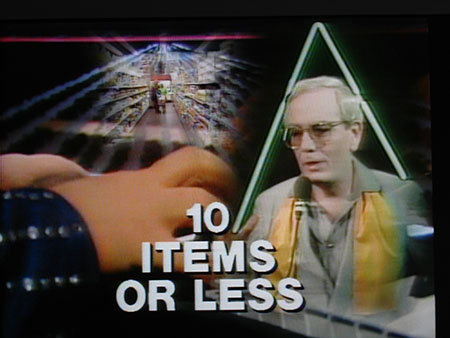
Ashley spoke with Alex Waterman:
What distinguishes traditional opera from any other form of narrative—like religious dramas, for example—is that most operas have a political landscape. This is especially true in Italian and German opera. You get a version of a landscape that has political meaning. I thought about that when contemplating the architecture of the opera house and how it makes those landscapes possible. Of course, that architecture is not available to me, nor would I want it to be. But the landscape has to be there however the opera is presented.
In the best of circumstances, the architecture and the music–for the people—match. But what’s happened in the last 50 to 100 years is that the music has outgrown the architecture. The instruments are old, the ideas are old—everything’s so old; it’s boring, you know? There is no architecture to deal with what we’re talking about here. I thought, There’s got to be one. And it occurred to me that our architecture might be the imaginary space behind the surface of the television screen. In other words, when you watch TV, you see whatever you see, but behind that there’s an imaginary space and maybe that’s the place for the music of our time.
It’s interesting how you can manipulate landscapes with television so that they have meaning. It’s different from having a person singing here, in my living room, which is something of a landscape. If you go outside of the personality of this room, the landscape is all of a sudden dramatically political—it’s a visual demonstration of how things work for everybody. That’s what opera is about. You’re trying to put the story in an appropriate place so that when you see it you say, Oh, that’s what the story is about!…
The landscape in Perfect Lives starts as big as possible, in The Park, and it’s described quite precisely in political terms. And then it goes to The Supermarket, which is not totally indoors. Then you get the ride through the landscape with the lovers eloping and the bank robbers driving to Indiana in The Bank episode, where you are dealing with mixed outdoors and indoors. Next, you enter the most close-range landscape, in The Bar with Rodney and Buddy talking. Then you move out again to a bigger space in The Living Room, which has more imaginary space. At the beginning of that episode, the characters talk about the Sheriff’s Wife as if she were on the South Pole and the Earth were revolving around her.
It is relentless. And mesmeric.
I.The Park (Privacy Rules)
II. The Supermarket (Famous People)
III. The Bank (Victimless Crime)
IV. The Bar (Differences)
V. The Living Room (The Solutions)
VI. The Church (After the Fact)
VII. The Backyard (T’Be Continued)
1.
2.
3.
4.
5.
9:00pm “The Living Room” from Varispeed Collective on Vimeo.
6.
5:00pm “The Church” from Varispeed Collective on Vimeo.
7. The Backyard
Janet Street-Porter Presents The Clash And The Sex Pistol’s First TV Show To Londoners In 1976
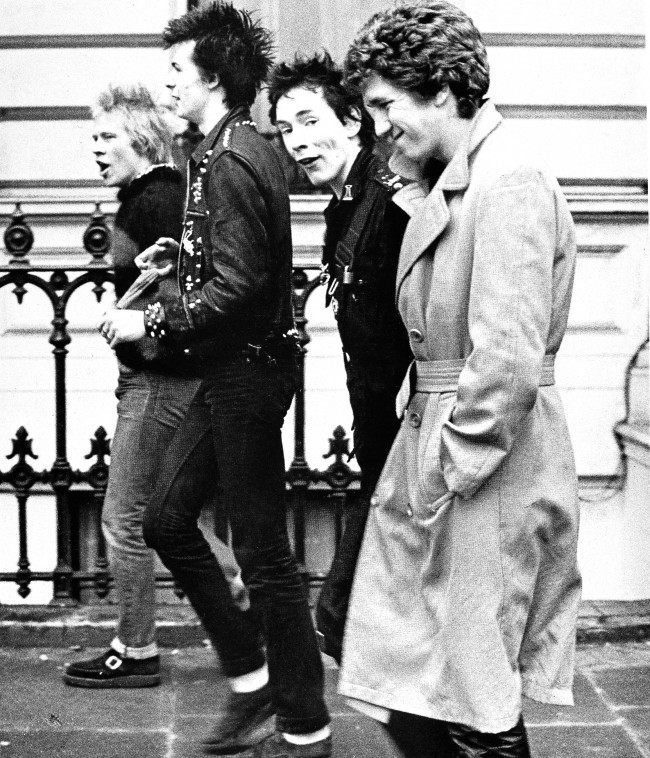
British punk rock band the Sex Pistols are seen in 1977. From left to right: Paul Cook, Sid Vicious, Johnny Rotten and Steve Jones.
IN November 1976, The London Weekend Show, introduced by Janet Street-Porter, took punk to the masses.
Read the rest of this entry »
Jake Bugg Predictably Slags Off TV Talent Shows
WHETHER you like it or not, the only music format that doesn’t seem to want anything to do with the working classes, is indie. Prick your ears up during an interview with almost any new British rock band, and you’ll not hear an accent amongst them. Pop, rap, metal and dance music meanwhile, are the playground for anyone who fancies it.
In the pop world, The X Factor, American Idol and Britain’s Got Talent are giving working class performers a shot at fame. Susan Boyle is a megastar, when no record company would touch her. Little Mix meanwhile, are a hotchpotch of regional accents (and most importantly, killer pop records).
Indie, meanwhile, looks like prog in the 70s, filled with a load of dreary, earnest humans who lack the hunger of someone like Oasis. Whether you liked the band or not, the urgency and desire in their early records was difficult to rail against.
Read the rest of this entry »
11 Examples That Prove Not Everything’s Better With Yakety Sax
CAN EVERYTHING be made better with Yakety Sax, even a Benny Hill sketch?
Homer “Boots” Randolph III ‘s 1963 record is a joyous thing. (That’s him below.) Originally released as the flip side to Boots’ first single release Percolator, it’s been an enduring hit.
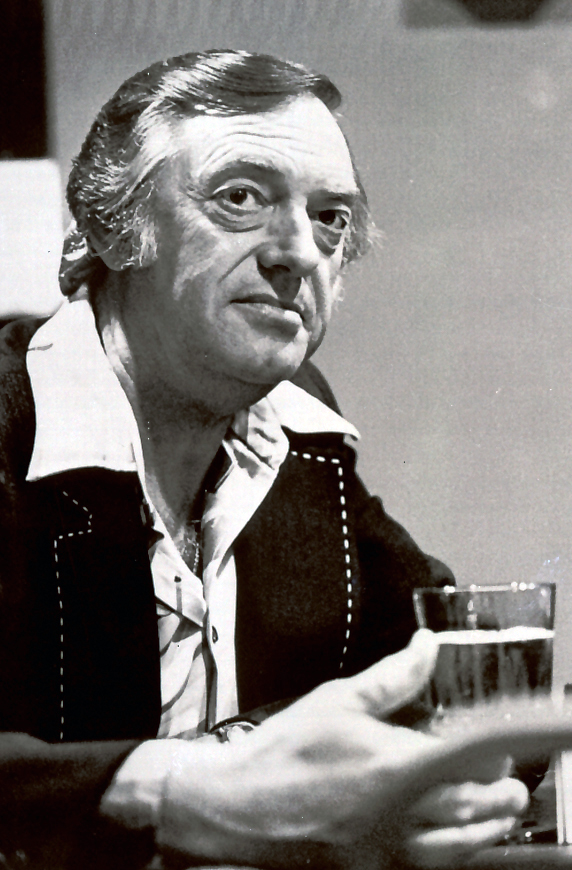
Can the song add humour to the humourless?
Black Metal
Dutch Trance
Ben Hur
Shrimp
Star Wars
Take it away, Homer:
And Chet Atkins, who turned the Sax into Yakety Axe (geddit?)
And if you want to sing along with Mark Knopfler, you can:
To prove that the Sax thrashes the axe (ann the piano – who asked for the piano?):
And with a silent movie soundtrack slant:
Finally, here’s Benny Hill. No, not with Yakety Sax. Even he tired of it:
Liam Gallagher Tells Oasis Fans Not To Buy Oasis LPs
NOT one for mincing his words, Liam Gallagher has told Oasis fans that they shouldn’t buy the forthcoming reissue of the group’s debut LP Definitely Maybe.
Why? Well, on Twitter, Our Liam got his one typing finger out, made sure caps lock was on, and said:
“HOW CAN YOU REMASTER SOMETHING THATS ALREADY BEING MASTERED.DONT BUY INTO IT.LET IT BE LG X”
Read the rest of this entry »
May The Verse Be With You: ‘70s Star Wars Music
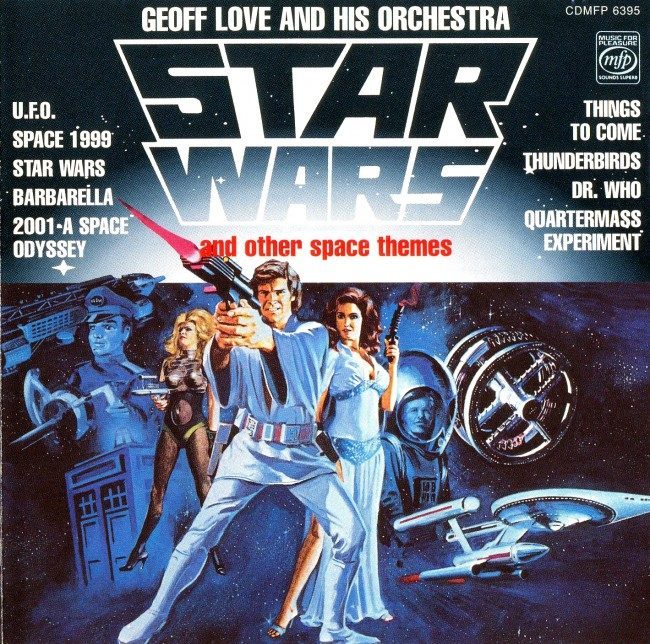
IN 1977, the entire planet was foaming at the mouth for anything Star Wars. The frenzy continued for several years with piles of Star Wars products flooding the stores daily. It seemed all you needed to do was bear a passing resemblance to the film or utter the words “star” and/or “wars” and your product would sell like hotcakes.
Read the rest of this entry »
Posted: 3rd, March 2014 | In: Film, Flashback, Key Posts, Music | Comments (2)
Beatles Dance Dance Nightmares: Raffaella Carrà’s 1978 Hellish Tribute To The Fab Four
Before the medly, here’s a dose of Carrà making Eleanor Rigby into her own. (And – boy- she can have it):. Dance Dance, Eleanor.
Read the rest of this entry »
Read Morrisssey’s Snippy, Snide And Spot-On Record Reviews For Smash Hits 1984
IN 1984, Smash Hits magazine invited Morrissey to review the latest pop sounds.

Highlights are many:
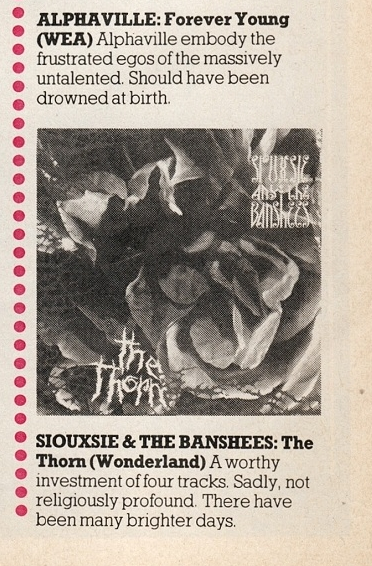
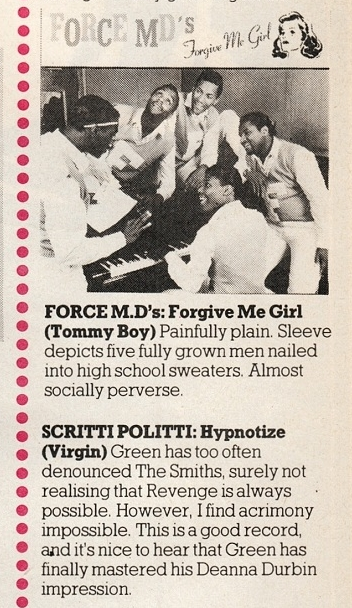
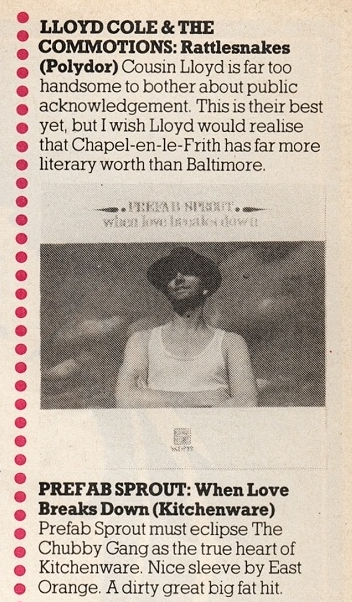
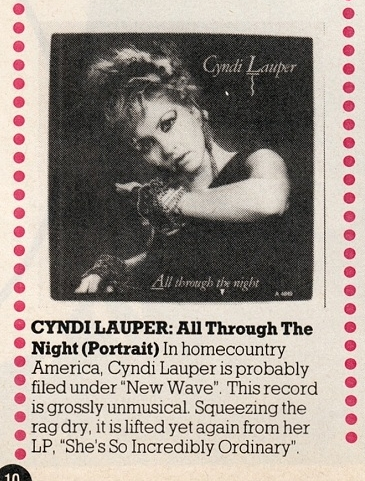
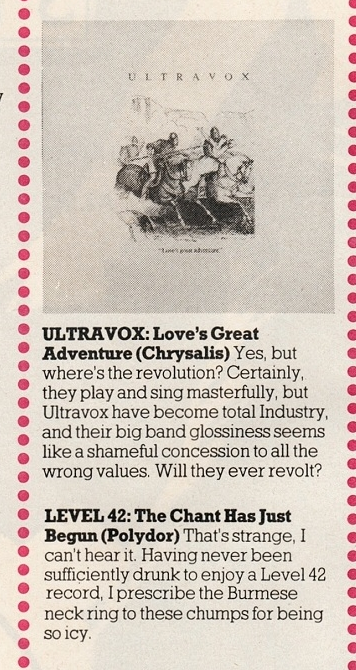
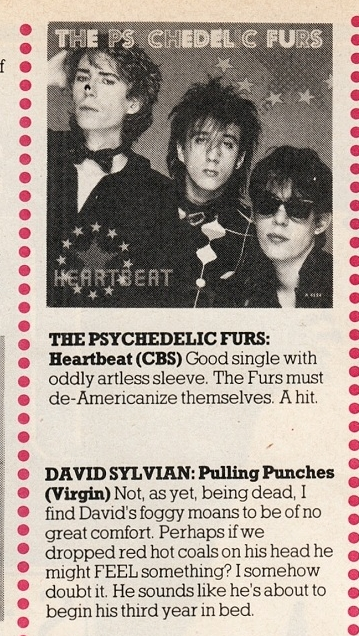
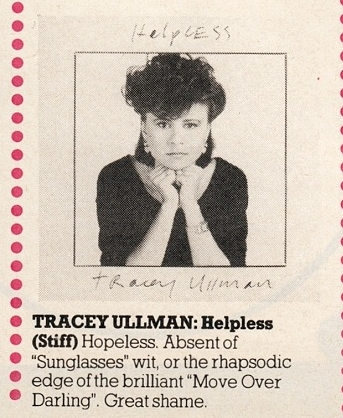
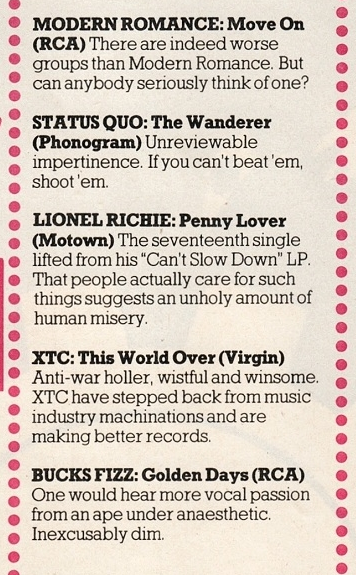
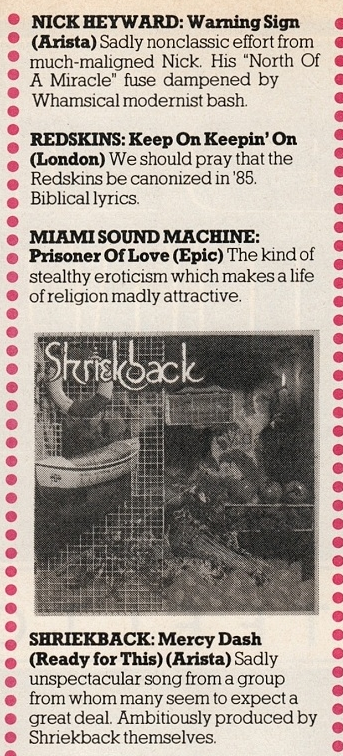
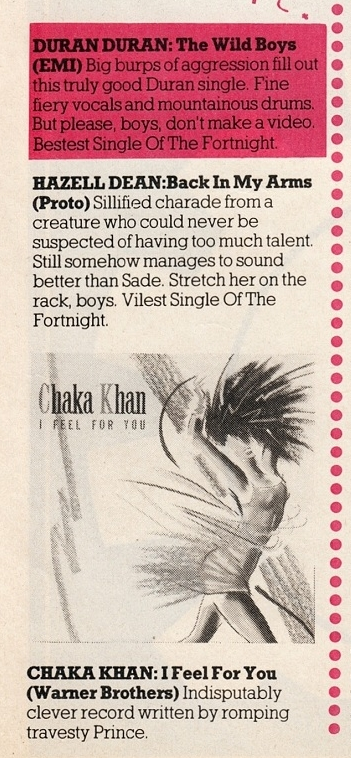
Spotter: Geek Tragedy
Morrissey Doesn’t Know Anyone… Who Would Like A Reunion of The Smiths
MORRISSEY, quite possibly the most tedious popstar ever created, is being all contrary again, giving withering looks and claiming that he doesn’t know a soul who wants a Smiths reunion.
Maybe that’s true because, in actual fact, he doesn’t have any friends or indeed, is surrounded solely by sycophants.
In an interview with Billboard, he said:
“I don’t know a single person who wants a Smiths reunion! But, no, there aren’t any bands I like to see again because your memory of them is how they were in their prime or at their best or at their most desperate, and you look to them to be someone that they no longer are.”
Read the rest of this entry »
SXSW won’t let Lady GaGa play gig inside a vending machine
THE swines at the City of Austin have mystifyingly refused to allow Lady Gaga a permit to play in a giant Doritos vending machine at the SXSW festival.
The idiots.
Mother Monster had been all set to play at the festival’s Doritos Stage (gee whizz, what a crappy name) which is mocked up to look like a huge dispensing machine. However, the show will not go on thanks to concerns over public safety.
Like anyone should be concerned for the public’s safety at a festival. Seriously. All festival goers either willingly jeopardise their own well-being or, failing that, deserve everything they get.
Don Pitts of Austin’s Music And Entertainment division said: “Our conclusion was based primarily on public safety concerns… We look at the size and capacity of the location covered by the permit being sought and how it fits with the anticipated attendance, based on event capacity and promotion. At the end of the day, it’s a parking lot.”
Even better! A giant vending machine in a car park! With Lady GaGa in it! How great would that have been?
Of course GaGa can still play at the event, but only if she can find herself a location with “the necessary permanent infrastructure”. Presumably, the ground we all stand on is not necessarily permanent enough.
The Roots Of Ska: From Tennessee, Through Jamaica To The Best of British
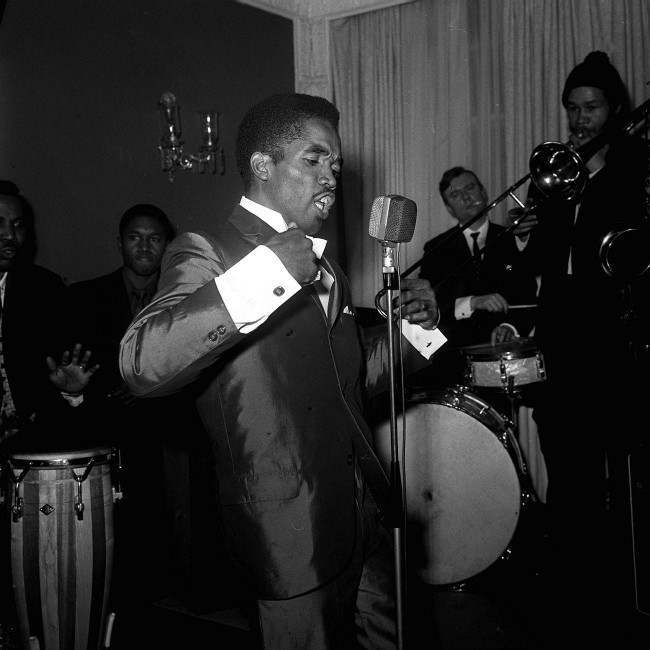
: It’s the Blue Beat style as demonstrated by Prince Buster (25) at a reception at the May Fair hotel in London. Blue Beat music is based on a West Indian blues style known as ‘Ska Blues’. Buster is here for radio and TV appearances and has brought a Blue Beat hat (a trilby) as gift for Prince Charles. Date: 27/02/1964
SKA music gets into your bones.
In is essay The Chop On The Upbeat, John Jeremiah Sullivan looks at the birth of ska, the music that make you dance – and that anyone can dance well to:
Once, writing about Bunny [Wailer], I spent the better part of a week getting completely out of my mind and surfing through songs, trying to pinpoint the emergence, from the chrysalis, of the ska sound. I wanted to be able to hold the evolution of it in my head, just for a minute, to say how it happened, session by session. You can’t really do it. Even when you know everything, I mean. There were too many active participants, too many shared influences, you’re inside an echo chamber with two hundred people shouting. Also there’s a weird fuzzy period between the rhythmic shot over the bow of “Easy Snappin’” (1957? 1958?—we’re not even sure) and 1960–61, when a little cluster of very ska–like songs gets recorded, in not entirely certain order.
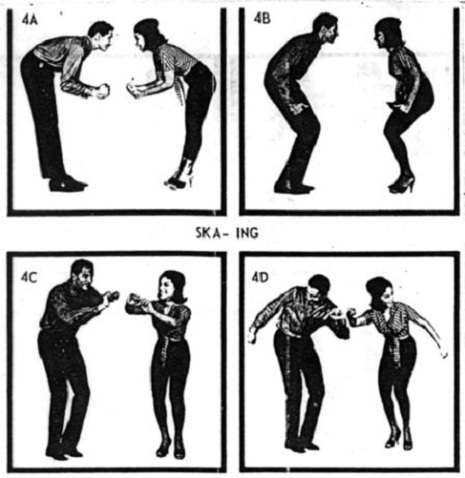
Read the rest of this entry »
Posted: 27th, February 2014 | In: Flashback, Music | Comment
Katy Perry: Now Single, Blasphemous And Hating Religionists For Allah Pendants
TOUGH week for Katy Perry. First off, and most pertinent to her well being, she’s split up with fellow superstar John Mayer. She’ll be upset by that no doubt, but alas, she should be aware that the whole of religion is pretty pissed off with her too.
You see, Katy’s new video for Dark Horse has been criticised by religious groups for being blasphemous!
Read the rest of this entry »
Listen To 13 Of The Absolute Worst Songs Of The 1960s

I HESITATED using the word “worst” since many of these are novelty songs, which are intentionally strange or humorous rather than attempting to be a genuinely serious musical composition. However, that doesn’t erase the fact that they, like all the songs in this list, are simply unlistenable, intolerable, and unbearable. These songs are so bad you will be tempted to escape and click your “back” button. But I encourage you to see it through – press on, and see what sort of stuff you’re made of.
Read the rest of this entry »
Posted: 26th, February 2014 | In: Flashback, Key Posts, Music | Comments (13)
Hard Rock Musicians Are All Women-Hating Wife Killers In Waiting – Even Worse Than Hip Hop Crims
WHEN someone in Hip Hop does something bad, it gets blanket coverage. Papers will run stories about artists big in the rap game, but not exactly household names. Worse still for those that are well known. They’re hauled over coals and every two-bit writer starts penning opinion pieces on whether or not Hip Hop is inherently bad, while offering mealy-mouthed “hey, some of my best friends are rap albums!” by way of cred-seeking.
Hip Hop’s cousin, Heavy Metal (or Hard Rock, or whatever) is usually the only one willing to give rappers a day off. When Metal is tacked to a crime, people start writing worthless pieces about devil worshipping and using disenfranchised lyrics as proof that rock bands actually want their fans to commit crimes.
Read the rest of this entry »
Your Guidebook to Creating a Proper Heavy Metal Album Cover
A PRIME reason for heavy metal’s success is that it is a culture unto itself. Fads come and go, but a culture has staying power. It comes with its own dress code, etiquette and idolatry. A small but important part of that culture is the album cover – the visual representation of the music, the heart of the heavy metal universe. If you’re a metal band, it’s imperative you get this facet right. So, let’s tour through some metal covers from the 1980s, a time when heavy metal was king, and learn from their successes and failures.
LESSON 1: THE 6 REQUIREMENTS
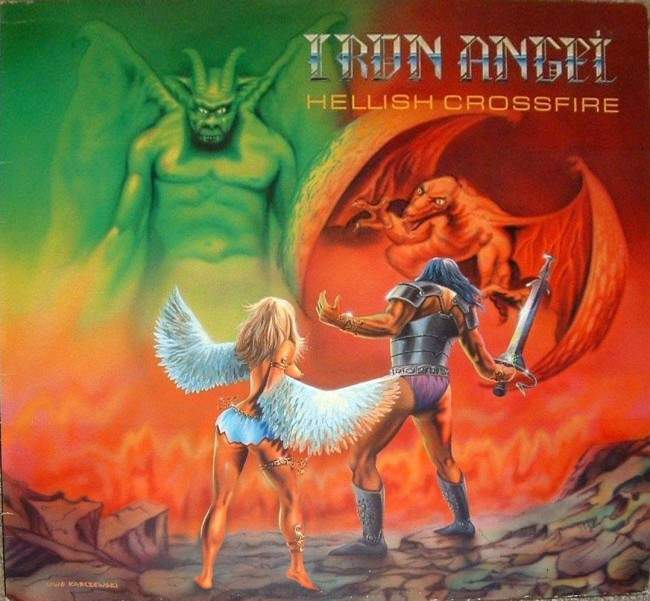
Iron Angel – Hellish Crossfire (1985)
Read the rest of this entry »
Posted: 24th, February 2014 | In: Flashback, Key Posts, Music | Comment
Good News: The Dying Record Industry Continues To Fleece Music Lovers And Acts For Mega Bucks
IDIOTS keep saying the music industry is dying. Of course it isn’t. Have you seen how much money they spent on The Brits? If they’re skint, award shows would be held in a pub function room with darts trophies handed to the three remaining artists who have been daft enough to sign to a record company.
No, the record industry is doing just fine.
Read the rest of this entry »
Posted: 23rd, February 2014 | In: Money, Music, Reviews | Comment
1972: Little Richard And ‘Screaming’ Lord Sutch Play Football At Wembley Stadium
FLASHBACK to August 3, 1972: Little Richard, the American rock singer, is seen with a football for a change. He and ‘screaming’ Lord Sutch, who is carrying a parrot at the Stadium in Wembley.
Posted: 22nd, February 2014 | In: Celebrities, Flashback, Music, Photojournalism | Comment
These TV Adverts For David Bowie’s 1974 Diamond Dogs Tour And Live Album Are Terrible
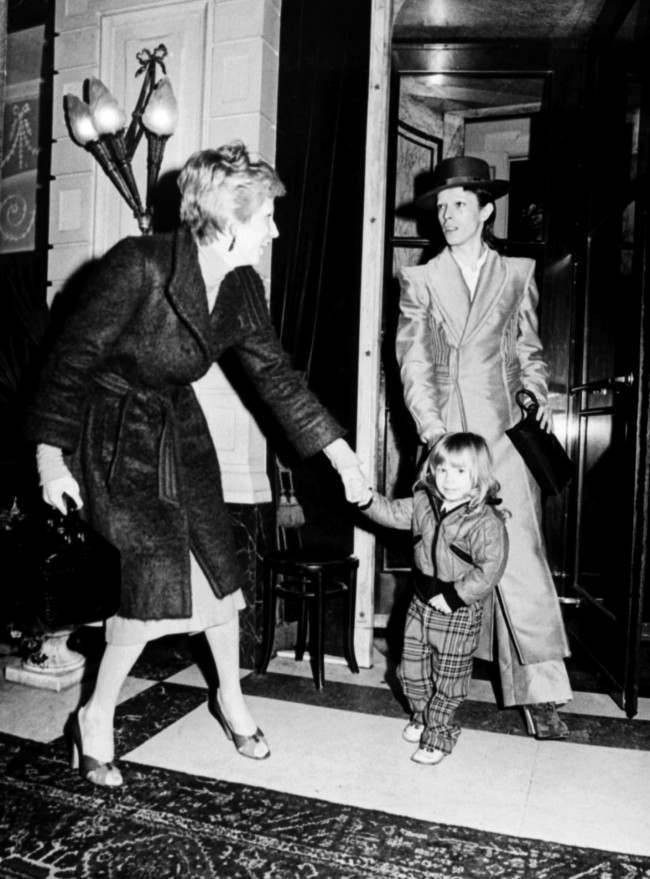
Rock star David Bowie, his wife Angie and their son Zowie. Date: 01/02/1974
IT’S 1974, and all the cool kids are buying David Live, David Bowie’s first live album, recored at Philadelphia’s Tower Theatre.
Well, they would buy it once they’re pocket had been emptied by this TV advert:
Read the rest of this entry »
Posted: 22nd, February 2014 | In: Celebrities, Flashback, Music | Comment
1964: Beatle Cult Hater Lord Willis Listens To The Yardbirds In His Back Garden
FLASHBACK: 17/05/1964. Music – Lord Willis listens to the Yardbirds in his back garden – 1964
Lord Willis, who recently attacked ‘The Beatle Cult’ in a House of Lords speech is pictured with his daughter Sally, as they listen to the Yardbirds in the back garden of his home in Shepherd’s Green, Chislehurst, Kent. The Yardbirds, a pop-group of five ex-public school boys from the Richmond area of Surrey, had unexpectedly visited Lord Willis to explain ‘what pop music is all about’. Lord Willis, the scriptwriter who created television’s ‘Dixon of Dock Green’ invited them into the garden where he was sunning himself. After a discussion, he then asked them to play. The group, who favour hairstyles short and long, are left to right: Eric Clapton, 19, Paul Samwell Smith, 21, Keith Relf, 21, Jim McCarty, 20 and Christopher Dreja, 18.
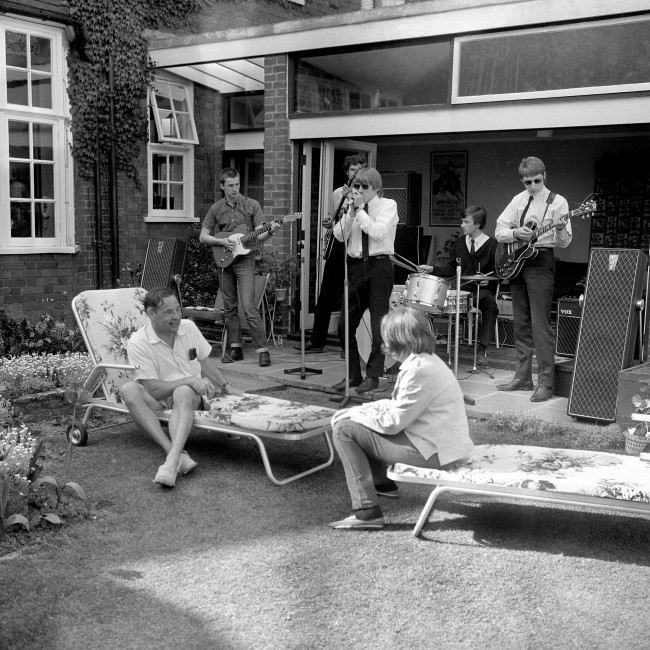
Posted: 21st, February 2014 | In: Flashback, Music, Photojournalism | Comment





